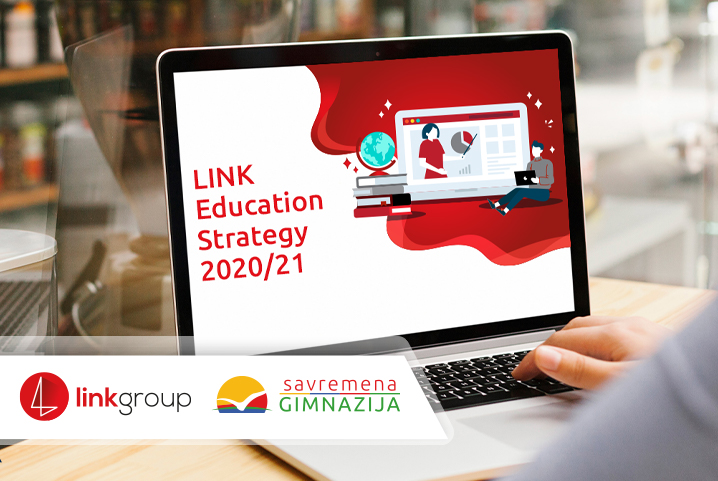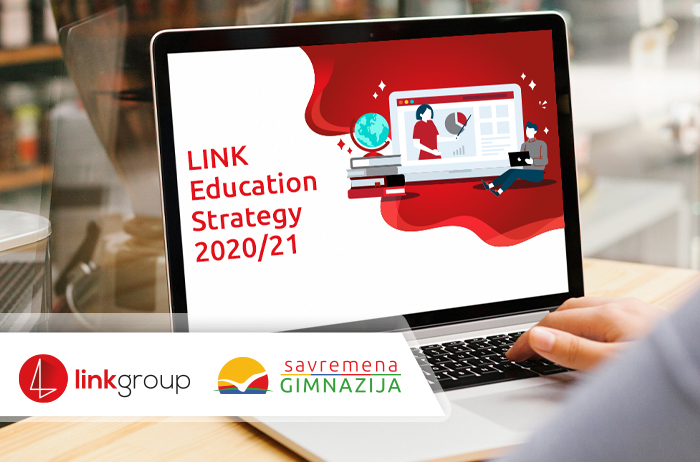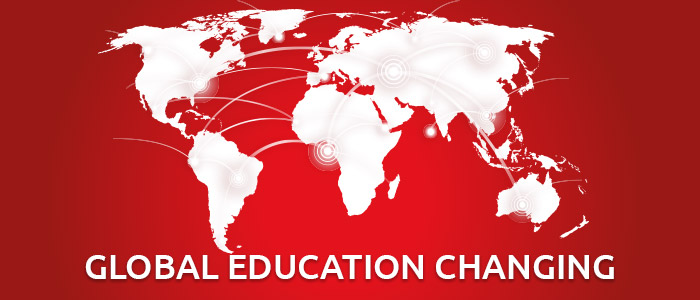
Savremena Gimnazija, as part of the LINK Educational Alliance, has adopted a new education strategy.
This unique strategy brings together many years of experience in the innovative teaching practice, and instructions for improving the modern learning and teaching process prescribed by Cambridge Assessment International Education, while also taking into account the recommendations of the Ministry of Education, Science and Technological Development with regard to behaviour during the COVID-19 pandemic, as well as current global educational models and trends, and the recommendations of the European Union.

Strategic focus: Holistic child development
This educational model is focused on holistic child development which encourages academic achievement, but also the development of a healthy personality. The learning process should involve skill and character development, as well as digital competencies development of both students and their teachers. The new strategy focuses on examples of educational and psychological practices that have been proved successful in education systems such as the Finnish and the Singaporean, especially in the realisation of digitally-oriented instruction which is combined with child personality development.
Evaluation as an instrument for teaching quality improvement
Using online instruction in educational and psychological purposes has undergone significant innovations, because nowadays, it involves the analysis of recorded lessons, which allows teachers to adapt to their students' educational needs through self-criticism and self-reflection, but also to improve their teaching, psychological, technical and other capacities. A team of psychologists and school counsellors provides constructive support in the process of reflection, analysing which elements were correctly applied in class and which should be improved in collaboration with teachers, thus enabling counsellors, psychologists and teachers to receive feedback on their work, as well as guidelines on how to improve their practice.
Creative, interdisciplinary, project-based instruction
The organisation of project-based instruction allows teachers to go beyond the framework of traditional education and to find creative ways to enrich instruction, and improve their students' motivation both in the virtual and physical classroom. On the other hand, students are able to create project tasks on their own in consultation with teachers, and to form interdisciplinary teams within which they will be graded both individually, and as a whole. In the previous school year, students of Savremena Gimnazija participated successfully and with great enthusiasm in the development of various interdisciplinary projects which encouraged their creativity, entrepreneurship and research work.

A unique, state-of-the-art distance learning platform
Thanks to our LINKgroup Distance Learning Platform, which represents the first state-of-the-art distance learning system in Serbia, lessons at Savremena Gimnazija were held without interruption. Students and parents could follow lessons both synchronously and asynchronously, which is a great advantage during a pandemic, and recordings of all lessons are available in the archive, so students can watch them at any time and from any place. A classroom without temporal or geographical limitations is a vision of education that is becoming a reality at Savremena even as we speak.
Our Distance Learning Platform, apart from providing support to students, teachers and parents by enabling them to watch lessons via the live stream, also represents a great tool for monitoring student progress through homework. This system is based on system emails that automatically notify students and their parents about deadlines for submitting homework, as well as about whether their homework has been submitted within the given deadline or not. The system is also connected to SMS which reminds students and parents of their responsibilities. Students and teachers can use their laptops and desktop computers, as well as their smartphones, tablets, iOS and Android apps. The impressions of students and their parents about distance learning at Savremena during the state of emergency confirm that, despite the challenging new circumstances, the quality of teaching and knowledge exchange have remained at the same level.
School days at Savremena in line with the new circumstances
The return to school requires special measures. Lessons are held in two shifts, from 8:15 to 10:30 AM, and from 12:10 to 3 PM.
The new model of education, as well as new learning process standards prescribed by the University of Cambridge, involve social and emotional learning, and provide support to students through different workshops, group meetings and one-on-one interviews aimed at helping students to overcome trauma and get used to the new routines of learning, socialising and behaviour in school in general. In addition, they have created models that refer to the reorganisation of teaching, and informing parents and students about preventive activities that need to be implemented.
In order to keep students and parents informed about all the particularities, especially during the period of adaptive instruction, they receive system emails on a daily basis. Students can also get information on their coursework in consultations before or after classes, which reduces the time they have to spend in front of a computer, and enables teachers to intervene efficiently, providing guidelines where necessary.
The beginning of the school year and nice weather should be used for outdoor instruction, which is traditionally carried out in Savremena Gimnazija through the concept of “the classroom without walls”. When organising such events, we always make sure that the groups are small, that there are no activities which may lead to droplet transmission of the virus, or activities that involve close physical contact.
All the innovations introduced by the strategy are fully harmonised with the recommendations of the Ministry of Education, Science and Technological Development regarding the coronavirus.
A new addition to the organisation of teaching at Savremena: Workshops in line with the Cambridge approach
A very important aspect of the new strategy of education are workshops and advisory work. Workshops address various topics, such as social values, ethics, solidarity, mutual support, acceptance of diversity, etc. In line with the recommendations of Cambridge Assessment International Education, the focus is on the concept of social and emotional learning in an online environment. Through various strategies of relaxation and focus, students are familiarised with ways to relieve stress, re-examine their decisions and control their emotions (mindfulness workshops). Savremena Gimnazija successfully launched an online classroom of the counselling and psychological services during the state of emergency which was constantly available to students, helping them to overcome their fears, answering their questions, and teaching them how to make the best use of the new situation.
Learning via an online platform during the state of emergency involves software specifically designed to raise social and emotional learning to a higher level. One of the creative solutions are online school clubs where students can record themselves, and upload their work process on the website. The project was designed and agreed upon in advance so students could use resources they had at home to experiment and advance knowledge sharing. For example, the English TEA (Teaching, Entertainment, Advancement) Time school club succeeded in encouraging students to participate in discussions in English more frequently and more enthusiastically during the state of emergency, than in regular lessons with the help of interesting and engaging topics.
New strategy: Guarantee of success in altered circumstances
The new education strategy is based on the analysis of information collected in class during the state of emergency, which means that it is built around tangible and measurable parameters, and designed as a vision of improving the human, material and organisational resources so as to achieve a maximum performance.
Through its new and improved curriculum adapted to the current needs and requirements of modern education, Savremena’s new education strategy proves that it can respond to the highly demanding teaching standards in the best possible way. Given our many years of experience in teaching, and modern solutions that are in line with the latest global standards, our newly adopted education strategy is a guarantee of success.

















